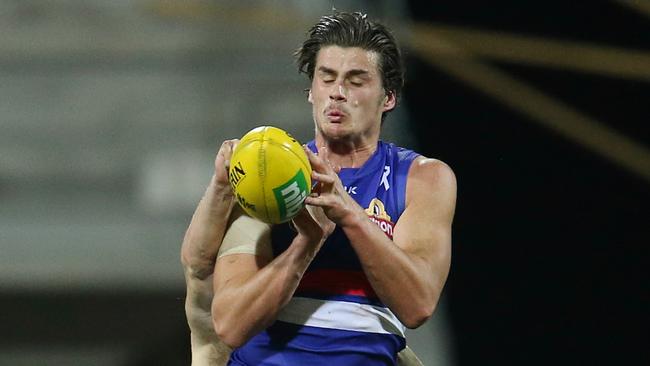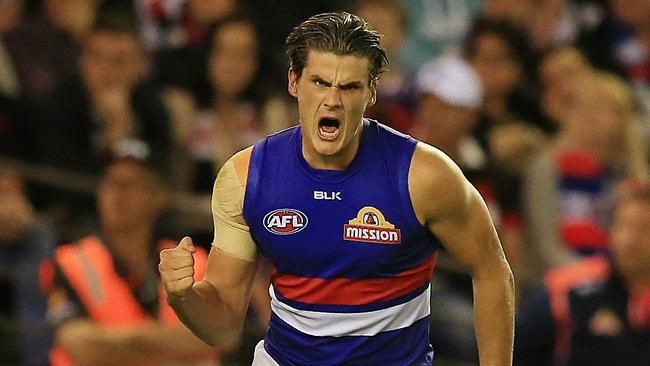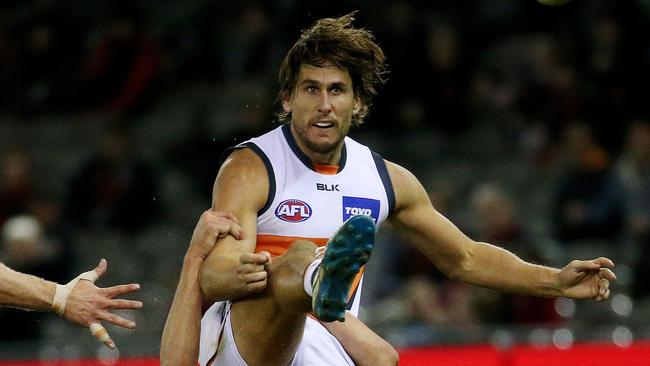Tom Boyd’s agent and Western Bulldogs in secret meeting five months before Ryan Griffen trade
THE mammoth trade that saw Tom Boyd become a Western Bulldog and Ryan Griffen defect to GWS was first flagged in a secret meeting five months before the deal was done.

Bulldogs
Don't miss out on the headlines from Bulldogs. Followed categories will be added to My News.
THE mammoth trade that saw Tom Boyd become a Western Bulldog and Ryan Griffen defect to Greater Western Sydney was first flagged in a secret meeting five months before the deal was done.
Western Bulldogs president Peter Gordon has opended up on his backroom role in the contentious $6 million deal, declaring that he makes no apologies for his “hands-on” presidential style as his club scraps for its first flag in six decades.
Boyd’s potential availablity and the Giants’ interest in former Dogs skipper Griffen were first discussed when Boyd’s manager, Liam Pickering, met with Bulldogs bosses in June 2014.
Gordon this week confirmed he later led the negotiations with GWS chief executive David Matthews in the dying days of the 2014 trade period, but only after months of ground work between the football department and Pickering.
“The decision to target Tom Boyd was a football decision,” Gordon told the Herald Sun.
“I learnt about the club’s prioritisation of him through discussions with them. (Former coach) Brendan McCartney in particular had a strong bent towards development and list building, and (list manager) Jason McCartney did as well.”

Gordon said he was invited into the initial meeting with Pickering and club football bosses five months before Griffen’s dramatic walkout opened the way for the deal to happen.
“Our club’s management asked me to come in and join the meeting, which was an unusual thing to do, in order to give an indication to Tom and to Liam Pickering of how serious our interest was,” Gordon said.
“The earliest I ever heard of Tom was when I was on the magical mystery tour to New York (with league chiefs and other club presidents in 2013) when Andrew Demetriou dropped his name over dinner one night and said this guy is a once-in-generation talent.
“That was before the 2013 draft and so when his name came up and our people were saying it’s going to be difficult to get him but we really need a key forward for the next 10 years and we’re going to need to go out of our way and do something unusual, my confidence in their view was fortified by what I had heard Demetriou say a year earlier.”
GORDON SETS THE RECORD STRAIGHT ON BOYD DEAL
The Dogs boss said reports Boyd was secretly driven in to his undergound carpark at his Hawthorn home during negotiations were wrong.
Gordon’s management style has come under fire since the sudden departure of chief executive David Stevenson two weeks ago.
But Gordon said the gap between the league’s richest and poorest teams made it imperative “our board participates proactively in many areas of the club”.
“You can either accept the status quo in that we are always going to make less money and be a smaller player and be accused of irrelevancy, or actually strike out on a course to try and win the flag and reach deep into September despite the structural inequalities that we face,” Gordon said.
“We have chosen, and I have chosen, to pursue that course aggressively and one of the lateral ways that we can do that is to deploy the resources of not just the president, but of the board.”

Gordon also revealed the club was set to launch legal proceedings against development company Prizac over a failed Edgewater pokies venue.
“It’s a multi-million-dollar claim and it will commence this year,” Gordon said.
Gordon’s private contributions to the Dogs since returning to the presidency four years ago have topped $2 million.
He said he was confident the club’s $9 million debt could be wiped within four years.
“When I became president it was somewhere near $12 million,” he said.
“Because we now have stronger revenues and stronger cash flows, we will be aggressively attacking our debt and debt reduction over the next four or five years.
“I’m quite confident that we will substantially reduce or even eliminate it before 2020.
“But it’s worth making the point that if the AFL introduced the sort of competitive balance mechanisms that they should have, and that other competitions did 10 or 15 years ago, there’s a reasonable chance that we’d already be debt free by now.”



